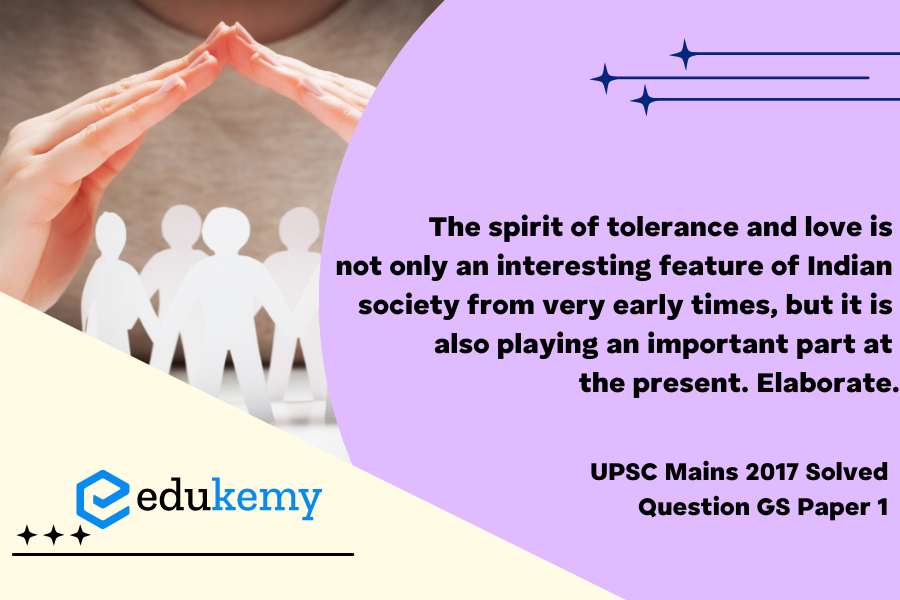The spirit of tolerance and love has been an intrinsic and captivating facet of Indian society since time immemorial, woven into the cultural fabric of the nation. From the ancient scriptures and philosophical texts to the present day, this enduring characteristic has not only withstood the test of time but has also emerged as a vital force shaping the contemporary Indian ethos. Rooted in the rich tapestry of diversity that defines the country, India’s history is replete with instances where various communities, religions, and cultures have coexisted harmoniously, fostering an environment of mutual respect and understanding.
Tag: Society of India.
Contents
Decoding the Question:
- In Introduction, try to briefly write about the love and tolerance in Indian society.
- In Body,
- Write how tolerance and love is a feature of Indian Society from an early time.
- Also, mention its importance in the present.
- In Conclusion, try to mention the overall significance of such values.
Answer:
Spirit of tolerance and love in Indian society can be defined as that harmony and assimilation which can be observed among the diverse communities of the country. This spirit can be seen in the ancient world where King Ashoka renounced all violence and war and took to preaching Dhamma, the special religion of love and peace.
Tolerance and Love is Feature of Indian Society from Early Time:
- Assimilation of cultures. – Then we can see that continuously throughout history, India has been home to people as diverse as the Hunas, Parthians, Greeks, Scythians, Turks, and later on the Mughals.
- Influence of Bhakti and Sufi movement – these movements preached the spirit of tolerance and love and were the most inclusive, simple forms of devotion to the almighty, which led to its popular acceptance.
- Indian philosophy – The philosophy of Sarva Dharma Sambhava, Vasudhaive Kutumbkam, etc. of ancient texts reflects the extent of tolerance and love.
Challenges to the Love and Tolerance:
- Votebank politics – Calling for votes in the name of religion leads to polarisation in societies.
- Communal Riots – Various communal violence, conversion movements, etc. show intolerant attitudes of some people that have strained social values. For example Violence after partition, the Delhi riots in 2020, etc.
- Increased socio-economic disparities – An increase in income inequality has fuelled social tensions which translates to an increase in crime rates.

Importance of Tolerance and Love in Present Times:
- Diversity and Pluralism: India is known for its diverse population, comprising people from various religions, languages, cultures, and backgrounds. Tolerance allows individuals to coexist peacefully, embracing and respecting the diversity that exists within the country. It fosters a sense of unity and strengthens the fabric of society.
- Social Harmony: In a country as diverse as India, tolerance and love are essential for maintaining social harmony. They promote understanding, acceptance, and empathy among different communities, reducing conflicts and fostering a peaceful coexistence.
- Conflict Resolution: Tolerance and love are crucial for resolving conflicts in a peaceful and constructive manner. By promoting dialogue, understanding, and compromise, these values can help address disagreements, bridge gaps, and promote reconciliation among different groups or individuals.
- Empowerment of Marginalized Communities: Tolerance and love play a vital role in uplifting marginalized communities and ensuring their inclusion in society. By embracing diversity and promoting equality, individuals from marginalized backgrounds can feel empowered, respected, and valued, leading to their overall development and well-being.
- Secularism and Religious Harmony: India is a secular country, and tolerance is fundamental to maintaining religious harmony. It enables people of different faiths to practice their beliefs freely, fostering a spirit of coexistence and mutual respect among various religious communities.
- Strengthening Democracy: Tolerance and love are essential for a vibrant democracy. They encourage open-mindedness, respectful dialogue, and the ability to listen to diverse perspectives. These values create an inclusive democratic environment where all voices are heard, fostering a healthy exchange of ideas and promoting progress.
Conclusion
- India exerts on citizens of this world a great unifying force. This is in the form of non-violence (Ahimsa), peaceful co-existence (NAM); in pledging protection to the global commons (Paris Climate Pact), to the rights of man (democracy, human rights), and to universal nuclear disarmament etc. If one day India has to shine in the comity of nations, if Indians have to truly get involved in the making of a better world, and if someday we have to get rid of tragic things like poverty, pollution, crime and terrorism etc, we will have to share this spirit of love and tolerance and spread it to all human societies across the world.
In case you still have your doubts, contact us on 9811333901.
For UPSC Prelims Resources, Click here
For Daily Updates and Study Material:
Join our Telegram Channel – Edukemy for IAS
- 1. Learn through Videos – here
- 2. Be Exam Ready by Practicing Daily MCQs – here
- 3. Daily Newsletter – Get all your Current Affairs Covered – here
- 4. Mains Answer Writing Practice – here


